In the Latter Day Saint movement, priesthood is the power and authority of God given to man, including the authority to perform ordinances and to act as a leader in the church. A group of priesthood holders is referred to as a quorum.

The Church of Jesus Christ is an international Christian religious denomination headquartered in Monongahela, Pennsylvania, United States. The church is a Christian Restorationist church and accepts the Book of Mormon as scripture. The church considers itself the gospel restored, or the original church and good news as established by Jesus Christ in the New Testament, restored upon the earth. It also claims to be the spiritual successor to the Church of Christ, organized by Joseph Smith on April 6, 1830. The church sees Sidney Rigdon as Smith's rightful successor following the assassination of Smith because Rigdon was Smith's first counselor in the First Presidency. The church is not officially affiliated with any other church, organization or denomination.

Richard Alan Dutcher is an American independent filmmaker who produces, writes, directs, edits, and frequently stars in his films. After making God's Army, a successful 2000 movie about LDS missionaries, Dutcher became well known among members of the Church of Jesus Christ of Latter-day Saints. Film critic Jeff Vice, of the Deseret News, dubbed Dutcher "The Godfather of Mormon Cinema," a title that is very important personally for Dutcher. In 2007, Dutcher left the LDS Church.
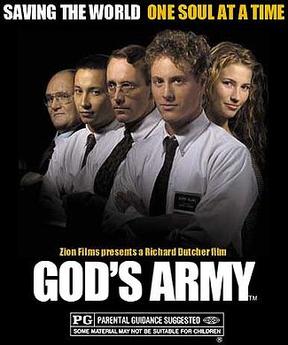
God's Army is a 2000 American independent film written, directed by and features Richard Dutcher.
David Wyman Patten was an early leader in the Latter Day Saint movement and an original member of the Quorum of the Twelve Apostles. He was killed at the Battle of Crooked River and is regarded as a martyr by members of the Church of Jesus Christ of Latter-day Saints. He is referred to twice in the Church of Jesus Christ's Doctrine and Covenants—once in section 114 and posthumously in section 124.

Mormon cinema usually refers to films with themes relevant to members of the Church of Jesus Christ of Latter-day Saints. The term has also been used to refer to films that do not necessarily reflect Mormon themes but have been made by Mormon filmmakers. Films within the realm of Mormon cinema may be distinguished from institutional films produced by the LDS Church, such as Legacy and Testaments, which are made for instructional or proselyting purposes and are non-commercial. Mormon cinema is produced mainly for the purposes of entertainment and potential financial success.

The Best Two Years is a 2003 dramedy film written and directed by Scott S. Anderson. It is based on the stage play The Best Two Years of My Life, also by Anderson. It portrays the experience of four LDS missionaries living in an apartment in the city of Haarlem in the Netherlands. The stage play had one setting, the apartment of the missionaries. The movie expands upon the play's setting, with some filming taking place in the Netherlands, but much of the movie still takes place in the apartment.

Ignacio Ariel Serricchio is an Argentine actor. He is known for his role as Diego Alcazar on General Hospital and as Alejandro "Alex" Chavez on The Young and the Restless. Other roles include Lifetime's Witches of East End, seasons 9-12 of Bones, and the Netflix reboot of Lost in Space.
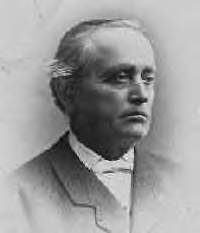
Erastus Snow was a member of the Quorum of the Twelve Apostles of the Church of Jesus Christ of Latter-day Saints from 1849 until his death. Snow was a leading figure in the Mormon colonization of Arizona, Colorado, and New Mexico.

Missionaries of The Church of Jesus Christ of Latter-day Saints —widely known as Mormon missionaries—are volunteer representatives of the church who engage variously in proselytizing, church service, humanitarian aid, and community service. Missionaries of the LDS Church may be male or female and may serve on a full- or part-time basis, depending on the assignment. Missionaries are organized geographically into missions, which could be any one of the 449 missions organized worldwide. This is one of the practices that the LDS Church is well-known for.
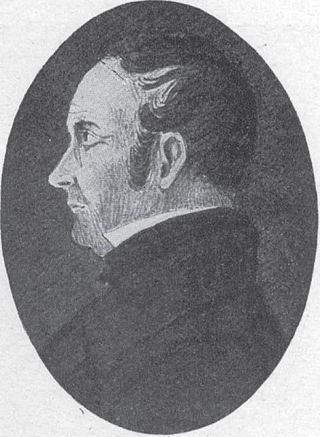
Joseph Fielding was an early leader of the Latter Day Saint movement. He served as the second president of the British Mission (1838–1840), coordinating the activities of missionaries in sections of the United Kingdom and parts of Europe. He was the brother of Mary Fielding, the second wife of Hyrum Smith, and an uncle of Joseph F. Smith, the sixth president of the Church of Jesus Christ of Latter-day Saints.
Wingfield Scott Watson was a religious leader of the Latter Day Saint Strangites. He was an Irish immigrant to the United States. He was baptized as a member of the Church of Jesus Christ of Latter-day Saints but was an advocate of the Strangite sect throughout his life.

Phineas Howe Young was a prominent early convert in the Latter Day Saint movement and was later a Mormon pioneer and a missionary for the Church of Jesus Christ of Latter-day Saints. Phineas Young was an older brother of Brigham Young, who was the president of the LDS Church and the first governor of the Territory of Utah.
Thomas Biesinger was a German convert to the Church of Jesus Christ of Latter-day Saints and a Mormon missionary to the Austro-Hungarian Empire. Biesinger was the first Mormon missionary to preach in the present-day Czech Republic and Hungary.

The Church of Jesus Christ of Latter-day Saints has had a presence in Mexico since 1874. Mexico has the largest body of LDS Church members outside of the United States. Membership grew nearly 15% between 2011 and 2021. In the 2010 Mexican census, 314,932 individuals self-identified most closely to the LDS Church.
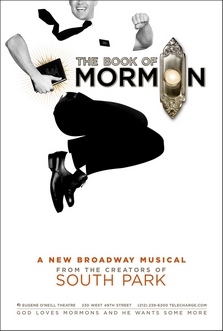
The Book of Mormon is a musical comedy with music, lyrics, and book by Trey Parker, Robert Lopez, and Matt Stone. The story follows two missionaries of the Church of Jesus Christ of Latter-day Saints as they attempt to preach the faith to the inhabitants of a remote Ugandan village. The earnest young men are challenged by the lack of interest from the locals, who are distracted by more pressing issues such as HIV/AIDS, famine, female genital mutilation, child molestation, and oppression by the local warlord.

The Church of Jesus Christ of Latter-day Saints was established in Japan in 1901 when the church's first missionaries arrived on August 12. Among them was Heber J. Grant, who was then a member of the Quorum of the Twelve and later became the church's 7th president. Horace S. Ensign, Louis A. Kelsch, and Alma O. Taylor accompanied Grant. The LDS Church's first baptism in Japan was on March 8, 1902, when Grant baptized Hajime Nakazawa, a former Kannushi. The Book of Mormon was translated three times. The first translation, which took over six years, was completed by Taylor in 1909. It was then recommended that the Book of Mormon be translated into bunshō, a more elegant literary style, which was done by Chōkō Ikuta in 1909, shortly before it was published and distributed. The third translation in 1957 was done by Tatsui Sato. In 1995, the Book of Mormon was translated again into a more colloquial style.

The Church of Jesus Christ of Latter-day Saints had a presence in Russia before the rise of the USSR, with the first baptisms occurring in 1895. Preliminary missionary efforts began before the dissolution of the Soviet Union, and the Russian government officially recognized the church in 1991. Membership increased in the 1990s and early 2000s. Missionary efforts were impacted by the 2016 Yarovaya law, which prohibited proselytizing outside of official church property. Current membership statistics are not available for Russia, but the church reported 19,946 members in 2009. As of February 2023, there were three stakes and three missions in Russia. In 2018, Russell M. Nelson announced that a temple would be constructed in a major city in Russia.
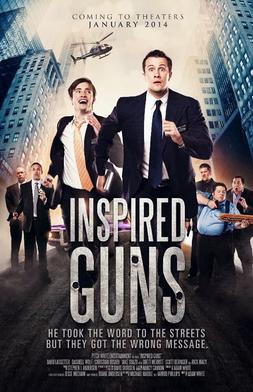
Inspired Guns is a 2014 comedy film. It was written, directed, and produced by Adam White, who also plays a role in the film. It is distributed by Pitch White Entertainment. Most of the cast and crew are members of the Church of Jesus Christ of Latter-day Saints and one of the stated goals of the movie is to "create good clean content" for family audiences.

The Church of Jesus Christ of Latter-day Saints in Iceland refers to the Church of Jesus Christ of Latter-day Saints and its members in Iceland. Missionary efforts of the Church of Jesus Christ of Latter-day Saints began in 1851 with the baptisms of two native Icelanders visiting Denmark. They returned to Iceland to share the gospel. Missionary work has continued since then, although there were no permanent missionaries in Iceland from 1914 to 1974. As of December 31, 2022, The Church of Jesus Christ of Latter-day Saints had 382 members in Iceland, divided into three congregations. There is also one Family History Center. On January 22, 2023, a Spanish language branch was created in Reykjavík bringing the number of congregation to four.
















